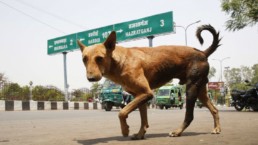
The stray animals challenge in numbers
600
million stray animals (dogs/cats) population worldwide
92
countries deal with stray animals' population management
$27
billion annual public spending on stray animals globally
Greece is among the very few European countries with a dramatically increasing number in the population of stray animals, currently exceeding 3,000,000, of which almost 1,500,000 are stray and shelter dogs. More than 92 countries are also struggling with the management of stray animals’ population currently reaching 400 million worldwide. In the EU and the US millions of unwanted healthy pets are entering animal shelters every year while the demand for new puppies and kittens is rising. The overpopulation of domestic animals has become an international environmental challenge. The treatment of sentient beings as commodities, the cultural biases against non-purebred animals, the lack of co-operation between animal welfare associations and local municipalities, the alarming increase of animal abuse incidents, the lack of training within animal welfare associations, the absence of digital tools in public sector and of reporting technology measuring the population of stray animals and pets are the main challenges targeted.
It is easier to determine solutions if we understand the underlying reasons on why we have so many strays on our streets:
- Pet owners abandon their pets;
- Animal welfare groups do not co-operate with their local municipalities;
- Public funds for stray animals are not spent according to a concrete population management strategy;
- Within the public sector, the use of software tools is limited in comparison to the private sector;
- People’s biases and beliefs on stray animals;
- Breeders’ production is not linked to the current stray animals’ population;
- Municipalities do not engage donors;
- Cities are reluctant to facilitate the adoption of stray animals abroad.
“The greatness of a nation and its moral progress can be judged by the way its animals are treated” Mahatma Gandhi
What your city should do in order to address the challenge
Understand the problem
Stray animals' management is a mutli-factor challenge; collect data, run surveys, discuss with other stakeholders.
Measure Performance
Track and measure the performance of all related stakeholders and management policies in place.
Know your partners
You have more partners as city as you may think. Animal lovers, welfarists, volunteers and sponsors help animals every day. Team up!
Engage the community
Adoptions, foster homes and volunteers are always needed for stray animals. Communicate to your community the ways your city can be supported to help stray animals.
Set up a plan
Annual planning on animal welfare is essential. Budgeting, neutering programs, foster and adoption policies, community fundraising need a concrete annual plan in order to make sense.
Adjust
Each city is unique; benefit from the data and the passion of your community and try new policies and ideas in order to make your city a better place for animals.

Hammoho software helps your city to:
Connect
Connect on a platform all stakeholders involved in animal welfare within your city
Measure
Measure performance and provide a cost benefit analysis on the annual budget
Engage
Engage citizens, sponsors, other cities; exchange resources and expertise
Plan
Plan your strategy based on concrete data and key performance indicators






